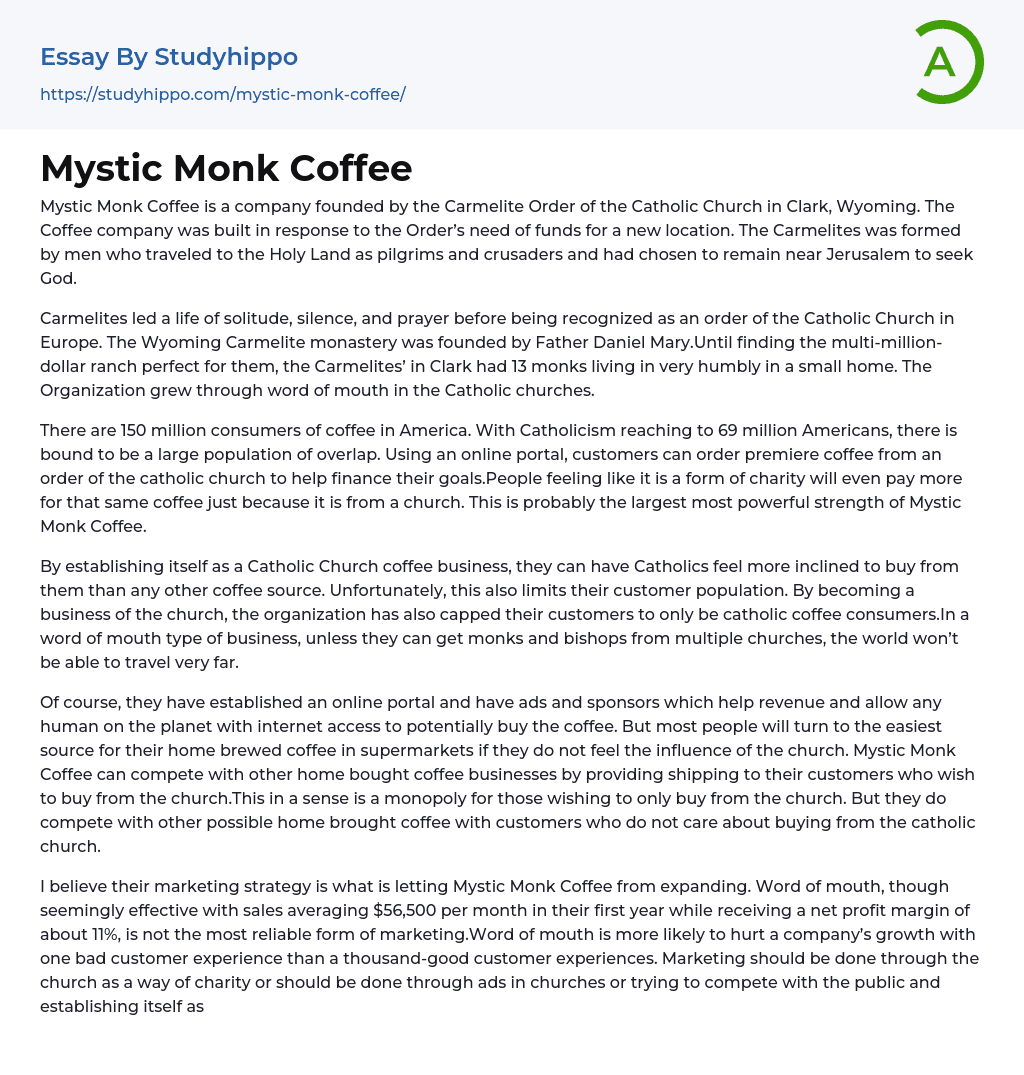Mystic Monk Coffee was established in Clark, Wyoming by the Carmelite Order of the Catholic Church, who needed funds for a new location. The Order's members originated as pilgrims and crusaders who traveled to the Holy Land but stayed near Jerusalem to seek God.
Carmelites used to live a solitary, silent, and prayerful life before being accepted as a Catholic Church order in Europe. Father Daniel Mary established the Wyoming Carmelite monastery, which previously consisted of 13 monks residing modestly in a small home in Clark until they discovered the suitable multi-million dollar ranch. Their growth was primarily through verbal communication in the Catholic churches.
In America, there are 150 million coffee consumers and 69 million Catholic followers, resulting in a significant intersection between the two groups. Mystic Monk Coffee offers premium coffee for purchase through an online
...portal, with proceeds supporting the Catholic Church's objectives. Customers perceive buying this coffee as a charitable act and are even willing to pay more simply because it's from a church. This is the organization's most potent and essential advantage.
By positioning themselves as a Catholic Church coffee company, they can appeal more to Catholic customers than other coffee vendors, but this also restricts their potential customer base to solely Catholic coffee consumers. Since this is a referral-based enterprise, without securing support from multiple churches' monks and bishops, the business won't be able to expand beyond a limited area.
Although Mystic Monk Coffee has an online portal, ads, and sponsors which help generate revenue and make their coffee accessible to anyone with internet access, many people still prefer to buy their home brewed coffee from supermarkets if they do not
feel the influence of the church. To compete with other home-brewed coffee businesses, Mystic Monk Coffee offers shipping to their customers who buy directly from the church, creating a monopoly for those customers. However, the company still competes with other possible home-brewed coffee options for customers who do not prioritize buying from a Catholic organization.
The marketing strategy of Mystic Monk Coffee is the reason behind their lack of expansion, according to my opinion. Although they had successful sales in their first year with a net profit margin of about 11% and an average monthly income of $56,500, relying solely on word-of-mouth promotion is not reliable. A single negative customer experience can hinder growth despite thousands of positive ones. To expand, Mystic Monk Coffee should consider alternative marketing techniques such as church charity events or advertisements in churches. They could also broaden their target audience by catering to multiple denominations instead of just Catholics. These actions have the potential to significantly increase customer base and surpass current limitations.
- Advertising essays
- Audience Theory essays
- Competitor Analysis essays
- Consumer essays
- Marketing Management essays
- Marketing Mix essays
- Marketing Plan essays
- Marketing Research essays
- Marketing Strategy essays
- Point Of Sale essays
- Price essays
- Procurement essays
- Product essays
- Product Differentiation essays
- Promotion essays
- Promotion And Marketing Communications essays
- Retailing essays
- Trademark essays
- Anheuser-busch essays
- Brands essays
- Detergent essays
- Product Placement essays
- Research Design essays
- New Product Development essays
- Advertisement essays
- Brand essays
- Sales Promotion essays
- Advertising campaign essays
- Consumer behaviour essays
- Offer And Acceptance essays
- Wal-Mart essays
- Discover essays
- Puritans essays
- Afterlife essays
- Buddhism essays
- Christianity essays
- Deism essays
- Faith essays
- God essays
- Hinduism essays
- Islam essays
- Jews essays
- Judaism essays
- Monotheism essays
- New Testament essays
- Ritual essays
- Sin essays
- Soul essays
- Theology essays
- Confession essays




